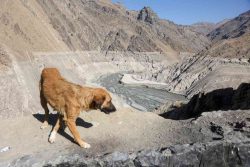12:38 JST, November 5, 2022
PARIS (AFP-Jiji) — The world’s current climate pledges are far off track to limit temperature rises to 1.5 C and will steer a world already wracked by increasing floods, heatwaves and storms toward “catastrophic” warming, the U.N. said Oct. 26.
In a report released before high-stakes climate negotiations, the United Nation’s climate change organization, said combined commitments from nearly 200 nations put Earth on track to warm around 2.5 C compared to pre-industrial levels by the century’s end.
With the planet already battered by weather extremes after 1.2 C of warming, experts said the world is failing to act with sufficient urgency to curb greenhouse gas emissions.
“We are still nowhere near the scale and pace of emission reductions required to put us on track toward a 1.5 C world,” said U.N. Climate Change chief Simon Stiell.
“To keep this goal alive, national governments need to strengthen their climate action plans now and implement them in the next eight years.”
The U.N.’s climate experts have said emissions — compared to 2010 levels — need to fall 45% by 2030 in order to meet the 2015 Paris climate deal’s more ambitious 1.5 C goal.
Current commitments from governments around the world will in fact increase emissions from the 2010 benchmark by 10.6% by 2030, the U.N. said. This was a slight improvement from a similar analysis a year ago.
U.N. chief Antonio Guterres stressed that the goal of limiting warming to 1.5 C was still within reach, but warned that the current trajectory of countries’ climate commitments was “catastrophic.”
“We must absolutely start reducing emissions now,” he said in an interview with the BBC.
When nations met for landmark climate talks in Glasgow last year, they agreed to speed up national climate pledges to cut carbon pollution and increase financial flows to vulnerable developing nations.
But only 24 countries had updated their plans at the time of the report, which Stiell said was “disappointing.”
“Government decisions and actions must reflect the level of urgency, the gravity of the threats we are facing, and the shortness of the time we have remaining to avoid the devastating consequences of runaway climate change,” he said.
He called on governments to revisit and strengthen their carbon-cutting plans in line with the Paris temperature goals before the U.N. climate meeting, which will be held from Nov. 6 to 18 in Sharm el-Sheikh, Egypt.
Nations are meeting in the shadow of Russia’s invasion of Ukraine and cascading global crises of hunger, energy prices and living costs, exacerbated by extreme weather.
Research by the World Resources Institute suggests that the world needs to curb emissions six times faster by 2030 than current trends to meet the 1.5 C warming cap.
Australia and Indonesia have offered “some momentum” by stepping up their climate pledges since the last U.N. climate negotiations, said WRI’s Taryn Fransen, adding that further announcements from a range of countries including the European Union, Turkey and Vietnam are expected this year.
She said the world’s second biggest emitter, the United States, took a “massive step” this year with measures in its new sweeping climate and inflation bill and urged China, the biggest emitter, to set a specific goal to cut planet-warming methane pollution.
A second U.N. report also released Oct. 26 looked at longer term and “net-zero” climate goals to around mid-century put forward by dozens of countries.
It found that those countries’ greenhouse gas emissions would be 68% lower by 2050 than they were in 2019, if all strategies were fully implemented.
“This is a sobering moment, and we are in a race against time,” said Sameh Shoukry, Egyptian minister of foreign affairs and president-designate of the upcoming U.N. COP27 talks.
Top Articles in Science & Nature
-

Japan Institute to Use Domestic Commercial Optical Lattice Clock to Set Japan Standard Time
-

iPS Treatments Pass Key Milestone, but Broader Applications Far from Guaranteed
-

Record 700 Startups to Gather at SusHi Tech Tokyo in April; Event Will Center on Themes Like Artificial Intelligence and Robotics
-

iPS Cell Products for Parkinson’s, Heart Disease OK’d for Commercialization by Japan Health Ministry Panel
-

Japan to Ban Use of Power Banks on Airplanes
JN ACCESS RANKING
-

Japan PM Takaichi’s Cabinet Resigns en Masse
-

Japan Institute to Use Domestic Commercial Optical Lattice Clock to Set Japan Standard Time
-

Israeli Ambassador to Japan Speaks about Japan’s Role in the Reconstruction of Gaza
-

Man Infected with Measles Reportedly Dined at Restaurant in Tokyo Station
-

Videos Plagiarized, Reposted with False Subtitles Claiming ‘Ryukyu Belongs to China’; Anti-China False Information Also Posted in Japan
























